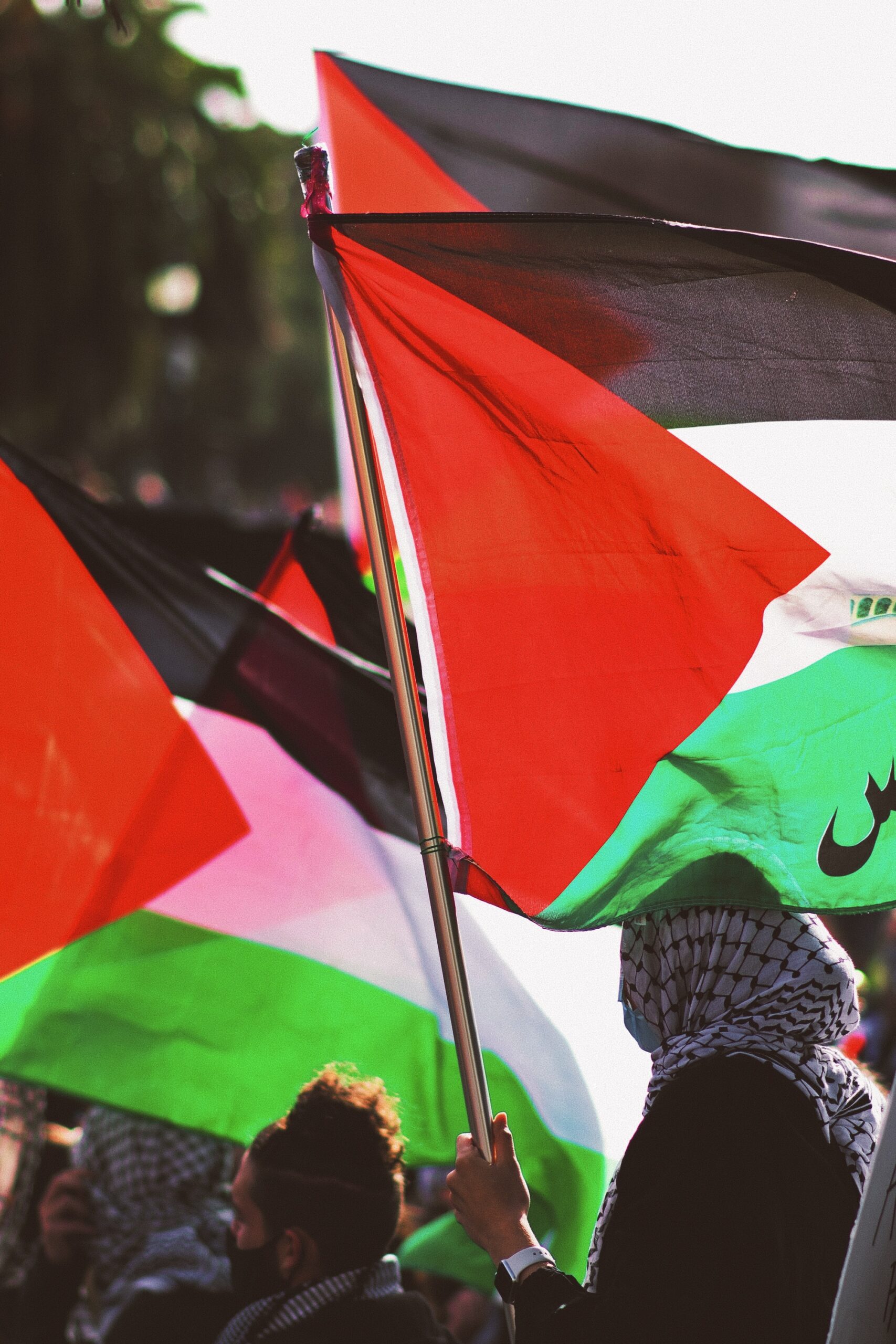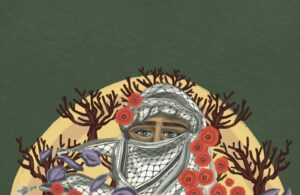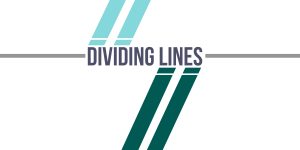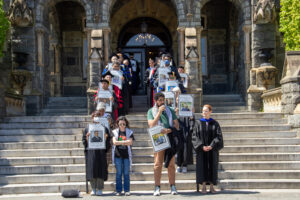Our bus jostled up and down on the uneven dirt road through the deteriorating neighborhood of Sheikh Jarrah, East Jerusalem. When my group arrived at a looming mound of rubble flanked between two untouched homes, its owner stepped forward: Yoise Zaloum, a Palestinian man whose home had just been demolished by the Israeli government.
Yoise’s family became refugees when they were forced from their homes in 1948 during the Arab-Israeli War. Fleeing to East Jerusalem, they had to build a new house for their family. When they were denied building permits, like 80 percent of the refugees who landed in the same neighborhood, they had no choice but to build anyway. A three-story structure for thirty relatives became home. Now, after this structure and all their belongings were demolished by the Israeli military, his family is being forced to rebuild again.
As an attendee of a conference in Bethlehem focused on the occupation, I had the chance to speak with Yoise just two weeks after his home was demolished. He explained how he was only given twenty minutes to evacuate and how he was responsible for paying for the demolition, the wages of the demolition workers, and the cleanup—but the military advised he wait to clear away the rubble until his neighbors’ homes were demolished, too.
I was initially shocked by the severity of such military violence and authorized oppression, but what came as the biggest surprise was the United States’ active involvement, and, perhaps even more alarming, our culpability as individuals.
In 2020, the U.S. gave $3.8 billion to the Israeli government, funding military development, wall construction, and settlement projects that have led to the displacement of Palestinians like Yoise. These efforts are a part of a larger movement to remove Palestinians from Jerusalem and build Israeli settlements on Palestinian land. Since 1967, an estimated 55,000 homes have been demolished, including almost 300 in 2021 alone, and thousands remain under continual threat. The excuse for most of the demolitions is a lack of building permits, despite the fact that the majority of permits filed are rejected; residents are illegally “squatting” and therefore have no right to the land. This logic applies to any Palestinians in the West Bank, which includes East Jerusalem and Gaza.
In many cases, residents have been living on their land since before the occupation, as with communities in Masafer Yatta. The UN reports that when the military moved in and declared the region a firing zone, residents faced evictions, military pressure, and like Yoise, widespread demolitions.
Built on the rubble of Palestinian homes are Israeli settlements: Enclosed, neighborhood-sized communities now home to over 700,000 Israeli citizens, many of whom immigrate to Israel for the education, housing, and business benefits of settlement life. These settlements are a violation of international law, which prohibits a country from moving its own citizens into occupied land. The UN has denounced the settlements, declaring they have no legal validity, but Israel’s plans for more development continue. In May 2022, Israel approved construction for another 4,000 settler units in the West Bank—a project endorsed and aided by the United States.
A combination of political advantages, pressure from religious groups, and anti-Middle Eastern sentiments has turned the U.S. into Israel’s largest financial and political supporter. Though this partnership has lasted three quarters of a century, recent developments of violence in Iran, Syria, and within the State of Israel itself have led the countries to strengthen their ties; the U.S. seeks to re-engage in the Middle East by prioritizing Israel’s security and economy. While the Biden administration has recently advocated for peace between Israel and Palestine by supporting a two-state solution, U.S. funding toward Israeli security allows for divisions to persist. As “peace talks” continue, so do U.S.-funded wall-construction, home demolitions, and military raids.
American lobbyists and religious groups have significantly impacted U.S. policies, too. Oragnizations like The American Israel Public Affairs Committee (AIPAC) and Democratic Majority for Israel (DMFI) work closely with the U.S. government to “encourage and persuade” specific pro-Israel policies, including heightened military defense programs and funding. Christian evangelical groups made up Trump’s core support base when he moved the U.S. embassy in Israel to Jerusalem in 2018. Based on the belief that Israel is the biblical homeland of the Jewish people, many of these groups support Israel as a part of their religious duty in helping fulfill end-times biblical prophecy. This community has generated hundreds of millions of dollars in donations.
As both a political and religious ally, the U.S. has exercised 44 vetoes in the UN Security Council to shield Israel from culpability for war crimes, always as the only vote against the resolution. Because the United States has such financial and political power, its pro-Israel position both protects and finances demolitions, settlements, and the occupation as a whole.
But it’s easy to blame the U.S. government for problems abroad. It’s much harder to see how our own conversations, biases, and omissions perpetuate the problem, too. A disproportionate number of our conversations in classrooms and online highlight Palestinian terrorism while ignoring violent Israeli military assaults. Individual support of a “bigger, badder” military leads to policies that favor of Israeli “security” investments for military dominance in the Middle East. General misconceptions, like the denial of the ethnic and religious diversity of Palestinians, lead to misinformed opinions of history and current events. Neutral discussions that protect ourselves— “I’m not against or for anyone”— maintain the unequal hierarchies and make no effort to solve them, as Jewish speaker Anna Balzter explained in her TED Talk.
But if we have the power to do harm, we also have the potential to do good. With waning support of Israel in younger generations, we are presented with the unique opportunity to reshape political trends. This means deviating from the decades-old cycle of pro-Israel policies and instead voting for decisions that hold the government accountable. It means demanding congressional support of sanctions until Israel complies with international law. It means advocating for bills like H.R. 2590 that prohibits Israel from using U.S. funding to commit human rights abuses. It means standing with Rashida Tlaib, the only Palestinian-American Congress member, who is actively speaking out against the United States’ military support. Day to day, it means bringing up the conflict in conversation, resolving misconceptions, and staying informed.
However uncomfortable it is, it also means taking a side. As Munther Isaac, author of The Other Side of the Wall, said, “Staying silent supports no one but the oppressor.”
Many of the Palestinians and Israelis I spoke with wanted to make one thing very clear: Anti-occupation is not anti-Jew or anti-Israeli. Rather, anti-occupation means opposing the power structures and ideologies that oppress the Palestinian people. Summing up the conflict as “Arabs versus Jews” neglects the diversity of both sides, largely because “Arab” is an ethnicity and “Judaism” is a religion, neither of which contain their manifold ethnic, political, and religious identities. I stayed with and learned from both Muslim and Christian Palestinians—though a waning population, Christian Palestinians play an active role in Palestinian society, organizing and peacefully protesting with their Muslim neighbors. Almost 45 percent of Israelis self-identify as secular non-Jew, and many actually oppose their own government’s occupation. In fact, the Jewish Voice for Peace is one of the leading groups against the occupation and Zionism.
The occupation is neither a religious nor an ethnic issue; it is a human rights issue. Refraining from action out of fear of antagonizing a nationality or a religion can no longer be an excuse. Taking a side means challenging the oppressive movement of the Israeli occupation, expressed in ongoing home demolitions and rapidly growing settlements.
As Americans, our conversations domestically have large-scale ripple effects abroad, our political and social presence influences international verdicts, and our neutrality deters the liberation of Palestine. And so, both culpable and empowered, we have a choice: To remain apathetic, or to listen, learn, speak, and act as allies of a people under oppression. I choose the latter.





